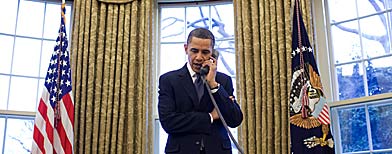Obama announces 15 recess appointments, scolds GOP
Contentious appointments
WASHINGTON – Fed up with waiting, President Barack Obama announced Saturday he would bypass a vacationing Senate and name 15 people to key administration jobs, wielding for the first time the blunt political tool known as the recess appointment.
The move immediately deepened the divide between the Democratic president and Republicans in the Senate following a long, bruising fight over health care. Obama revealed his decision by blistering Republicans, accusing them of holding up nominees for months solely to try to score a political advantage on him.
"I simply cannot allow partisan politics to stand in the way of the basic functioning of government," Obama said in a statement.
The 15 appointees to boards and agencies include the contentious choice of union lawyer Craig Becker to the National Labor Relations Board. Republicans had blocked his nomination on grounds he would bring a radical pro-union agenda to the job, and they called on Obama not to appoint Becker over the recess.
Obama went ahead anyway, while also choosing a second member for the labor board so that four of its five slots will be filled. The board, which referees labor-management disputes, has had a majority of its seats vacant for more than two years, slowing its work and raising questions about the legality of its rulings.
Overall, Obama's appointments will take place throughout the week, allowing people to make the transition to their new jobs, White House spokeswoman Jen Psaki said. The news of Becker's appointment drew the bulk of the ire from Republicans.
"Once again the administration showed that it had little respect for the time honored constitutional roles and procedures of Congress," said Republican Sen. John McCain of Arizona, Obama's foe in the 2008 presidential election. "This is clear payback by the administration to organized labor."
Both Republican and Democratic presidents have made recess appointments, which circumvents the Senate's authority to confirm nominees, when they could not overcome delays. President George W. Bush made more than 170 such appointments in his two-term presidency. President Bill Clinton made nearly 140.
Obama had been on record as warning of recess appointments if the Senate didn't act. He followed through at the end of a week in which his political standing was significantly bolstered by the party-line passage of a historic health care bill, a student loan overhaul and a hard-fought nuclear arms treaty with Russia.
The White House dropped the news in a press release on a quiet Saturday, with Obama at Camp David and lawmakers home in their districts.
The recess appointments mean the 15 people could serve in their jobs through the end of 2011, when the next Senate finishes its term. A recess appointment ends at the completion of the next Senate session or when a person is nominated and confirmed to the job, whichever comes first.
Obama filled two posts at the Treasury Department: Jeffrey Goldstein as under secretary for domestic finance and Michael Mundaca as assistant secretary for tax policy. He singled them out: "At a time of economic emergency, two top appointees to the Department of Treasury have been held up for nearly six months."
On Becker, Republicans have held up his confirmation for months, saying they fear he would circumvent Congress to make labor laws more union-friendly.
Democrats had failed to overcome Republican delaying tactics on Becker's nomination, and all 41 GOP senators wrote to Obama on Thursday urging him not to appoint Becker over the break — to no avail. Becker is a top lawyer at the Service Employees International Union and the AFL-CIO.
Labor unions were especially keen on getting Becker installed on the board that is responsible for certifying union elections and addressing unfair labor practices. Under a Democratic majority, the labor board could decide cases or make new rules that would make it easier for unions to organize workers. The board could allow speeded-up union elections that give employers less time to counter organizing drives.
The other pro-union lawyer Obama named to the board, Mark Pearce, has not faced opposition from Republicans.
The White House says its appointees have been awaiting a vote for an average of seven months.
Obama named three people to the Equal Opportunity Employment Commission, which has also been operating without a quorum.
The Senate's top Democrat, Harry Reid, welcomed Obama's move. "Regrettably, Senate Republicans have dedicated themselves to a failed strategy to cripple President Obama's economic initiatives by stalling key administration nominees at every turn," said Reid, the majority leader from Nevada.
Obama and Democratic leaders say he faces more obstruction, in terms of the number of pending nominees and the length of their delay in getting a vote, than Bush did. The hyper-partisan atmosphere in Washington began long before Obama's presidency but remains as entrenched as ever, if not worse, during his term.
Already in a struggle with the U.S. Chamber of Commerce over a financial overhaul, Obama now has another one over Becker. "The business community should be on red alert for radical changes that could significantly impair the ability of America's job creators to compete," the chamber said in a statement.
In February, Democrats fell far short of the 60 votes they needed to push through Becker's nomination. Two Democrats joined Republicans to halt Becker.
Senate Minority Leader Mitch McConnell said Saturday that Obama's move is "another episode of choosing a partisan path despite bipartisan opposition."

No comments:
Post a Comment